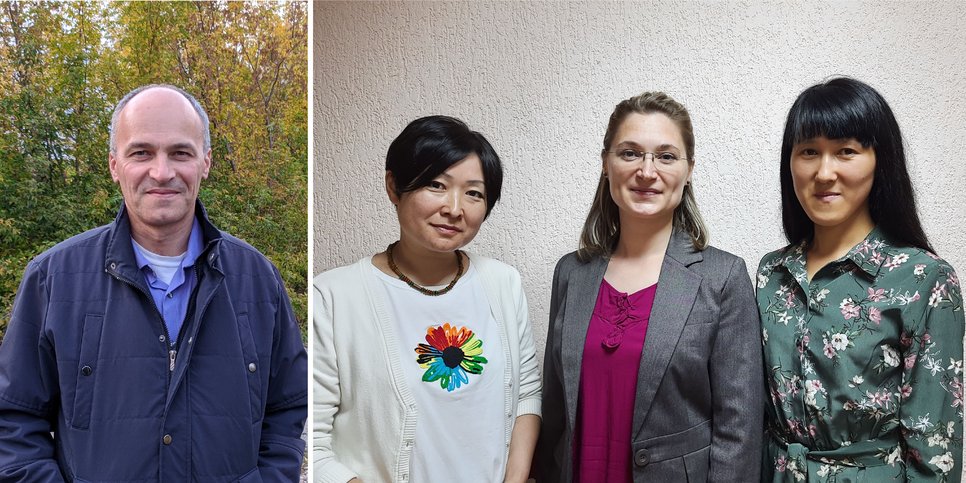In the photo: Sergey Polyakov, Guahar Bektemirova, Anastasia Polyakova, Dinara Dyusekeeva
In the photo: Sergey Polyakov, Guahar Bektemirova, Anastasia Polyakova, Dinara Dyusekeeva
The Court of Appeal in Omsk Upheld the Convictions of Four Jehovah's Witnesses. One of Them Will Go to Prison
Omsk RegionOn May 28, 2021, the Omsk Regional Court upheld the verdict of Sergey and Anastasia Polyakov, Gaukhar Bektemirova and Dinara Dyusekeyeva. The court found it extremist that they were meeting to discuss the Bible.
On November 30, 2020, the judge of the Pervomaisky District Court Denis Pershukevich found Sergey Polyakov guilty under Art. 282.2 (1) of the Criminal Code of the Russian Federation and sentenced to 3 years in a general regime colony. Three more women were sentenced by the court under Art. 282.2 (2) in the form of imprisonment conditionally: Anastasiya Polyakova for a term of 2 years and 6 months, Gaukhar Bektemirova - 2 years and 3 months, Dinara Dyusekeyeva - 2 years.
The prosecutor requested 6 and a half years of real imprisonment for Sergey Polyakov. The state prosecutor asked Anastasiya Polyakova, Dinara Dyusekeyeva and Gaukhar Bektemirova to be sentenced to 2 years of suspended imprisonment.
The couple spent 5 months in solitary confinement and 3 months under house arrest. Dinara and Gaukhar have been under recognizance not to leave for more than a year and a half.
Anastasiya Polyakova became the first woman - Jehovah's Witness in the history of modern Russia, who found herself behind bars for her faith.
Sergey and Anastasiya Polyakovs were detained during searches on July 4, 2018. During the arrest, Sergey was beaten and then forced to wipe the blood off the floor. Over the next two days, the couple did not get in touch, the door to their apartment was found broken open. Simultaneous searches were carried out in at least 4 homes of believers. During the search, the attesting witnesses actively helped law enforcement officers, prompted and even tried to interrogate believers. Veterinarian Dinara Dyusekeyeva and her friend Gaukhar Bektemirova came under investigation about a year after the Polyakovs. In the summer of 2019, a criminal case was also initiated against them, which was connected with the case of Anastasiya and Sergey.
In the summer of 2018, the Investigative Committee opened a similar criminal case against Igor Zhukov in Omsk.
The court found the believers guilty only because they participated with their fellow believers in peaceful worship and talked with other people about the Bible. In reality, these actions are not prohibited by the Criminal Code of the Russian Federation. On the contrary, they are guaranteed by the Constitution of the Russian Federation as fundamental human rights and freedoms.
The entire logic of the accusation is based on the speculative thesis that faith in God is "a continuation of the activities of an extremist organization." Among the proofs of the "guilt" of the Polyakovs, Bektemirova and Dyusekeyeva - 20 biblical cartoons, which were reproduced at court hearings, and the Bible in different languages.
The defendants themselves explained in their testimony that they were exercising their constitutional right to disseminate their religious beliefs, since "Article 28 of the Constitution of the Russian Federation applies to all believers." They categorically denied their involvement in extremism and during the appeal hearings tried to explain the essence of their faith to the court. The chairman of the board of the court, Aleksandr Bondarenko, repeatedly interrupted the defendants' speeches with the last word. Without allowing Sergey Polyakov to finish, the panel of judges retired to the deliberation room, after which they announced the decision: in terms of punishment, to leave the sentence in force. Thus, the court equated peaceful believers with dangerous criminals. Convicted persons have the right to appeal against the verdict in cassation, as well as in international instances.
The European Union is deeply concerned about the situation surrounding Jehovah's Witnesses in Russia: “As we have already stated many times, all people, including Jehovah's Witnesses, should be able to peacefully enjoy their human rights, including the right to freedom of religion or belief, freedom of association and peaceful assembly and freedom of expression, without discrimination, which is guaranteed by the Constitution of the Russian Federation, Russia's commitments within the OSCE and international commitments”.




